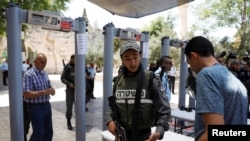Islamic leaders called on Muslims on Monday to boycott a Jerusalem holy site, which lies at the heart of the Israeli-Palestinian conflict, in protest after Israel set up metal detectors at the site's entrance gates following a deadly Arab attack there last week.
For the first time in decades, Israel closed the site — sacred to Muslims as the Noble Sanctuary and to Jews as the Temple Mount — on Friday, after three Arab Israeli citizens opened fire from the holy compound with automatic weapons, killing two police officers before they were shot and killed.
Israel reopened the compound to Muslim worshippers on Sunday after imposing new security measures, including metal detectors at the entrance gates and additional security cameras.
The Waqf, Jordan's Islamic authority that manages religious affairs at the site, was outraged over the metal detectors. Dozens of worshippers have prayed on the streets near the gate after refusing to enter via the metal detectors. Minor scuffles broke out there on Sunday as some Muslim worshippers tried to stop others from using the gates, Israeli media reported.
Police said that despite the tensions, hundreds of worshippers had entered the compound.
The Waqf, together with other Islamic groups, issued a statement Monday calling on Muslims "to reject and boycott all the Israeli aggression measures, including changing the historical status quo including imposing the metal detectors."
They called on the faithful "not to deal with it at all and not to enter the mosque through it at all." The statement further said that "if the metal detectors continue to be imposed, we call upon the people to pray in front of the gates of the mosque and in the streets of Jerusalem."
The fate of the compound, holy to both Jews and Muslims, is an emotional issue and forms the centerpiece of rival Israeli and Palestinian national narratives. Any perceived changes to the delicate arrangements at the site can spark tensions. Its closure after Friday's attack prompted condemnations from the Arab world.
Jordan called for its immediate reopening and there were protests in the streets there against Israel, with which Amman has a peace treaty.
Israel did not coordinate the changes with Jordan, which serves as the custodian of the Muslim-administered site, according to a Jordanian government official. Jordan's stance is that anything installed at the site must be approved by the Waqf, or Muslim administration, and cannot change the status quo, said the official. He spoke on Sunday on condition of anonymity because he was not authorized to discuss the situation with reporters.
Jews revere the site, where the two Jewish temples stood in biblical times, as the Temple Mount. It is the holiest site in Judaism and the nearby Western Wall, a remnant of one of the temples, is the holiest place where Jews can pray.
Muslims regard the same hilltop compound as the Noble Sanctuary. Home to the Al-Aqsa Mosque and Dome of the Rock, it is Islam's third-holiest site after Mecca and Medina in Saudi Arabia.
Police have been gradually reopening the site. On Monday it opened to visitors.
Jerusalem police commissioner Yoram Halevy said the metal detectors were necessary for the site to reopen.
"I assume that with time they will understand that this is not terrible," he told Army Radio. He said that security measures of this kind are commonplace in the world.
"When I go shopping on Friday I pass through a detector at the mall," Halevy said. "We see them everywhere they have become a part of our lives."




